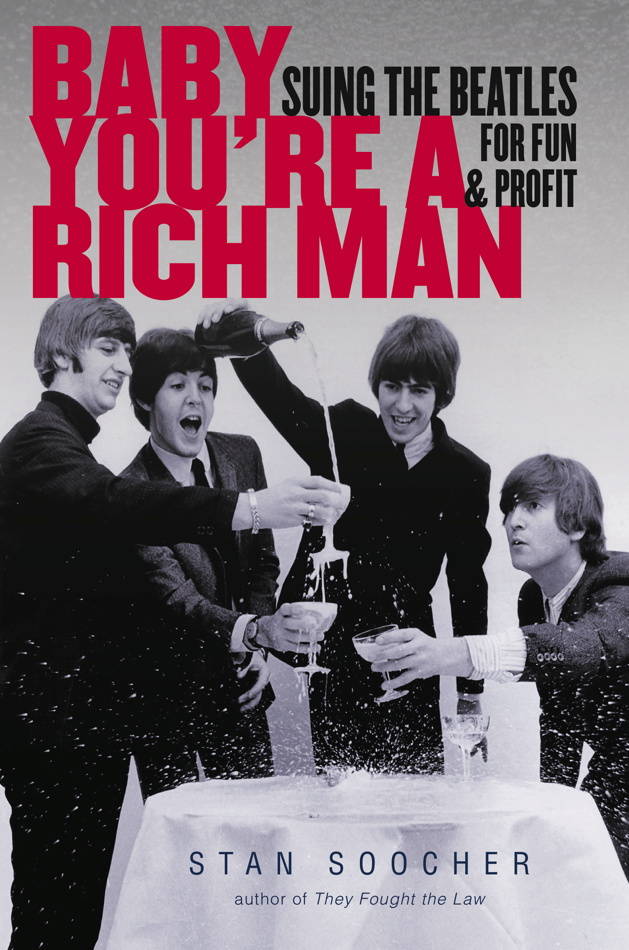Book Review: Baby You’re a Rich Man

Baby You’re a Rich Man: Suing the Beatles for Fun and Profit by Stan Soocher; published by ForeEdge, an imprint of University Press of New England. Photograph Courtesy of Stan Soocher.
Being the pioneers of something almost automatically means not everything will be done to the standards you’ve yet to create. So, it should come as no surprise the now-legendary Beatles didn’t manage every aspect of their monumental success as appropriately as is now customary within the entertainment industry. And yet, this remains a point of contention because, still today, fans wonder what might’ve been had the Beatles remained together, continuing to crank out super singles and perfectly-crafted concept albums that would make Beach Boy Brian Wilson blush.
So, give it to us straight. Just who, exactly, broke up the Beatles? Was it Yoko? Was it Paul? That malicious manager, Allen Klein, and ABKCO? Some may ask whether this question even remains relevant. However, when you’re talking about the greatest rock band of all time, a band who is foremost when one is introduced to music, a band who—across international waters—defined the breadth and depth of a generation, this remains the only question. Just like in Oliver Twist, after hearing the entire Beatles catalog, we are left wanting more.
At last, a new perspective
When pondering the question of the Beatles’ ultimate demise, author Stan Soocher offers a point of clarification in his book, Baby You’re a Rich Man. Perhaps the question begins with “what” and not “who.” What, then, broke up the Beatles?
Beatlemania began in Britain in 1963, and, by 1964, the band’s management was already entangled in what would become the first of many lawsuits—all of which are meticulously recorded by Soocher, an entertainment lawyer and author who regularly writes for Rolling Stone.
This book serves as a shining testament to doing one’s own housekeeping. The one fatal flaw rearing its ugly head in each of the bandmates’ behavior is their presumed naiveté which leads to eventual arrogance—collectively and individually. Even after creating their own record label, Apple Corps, they still just couldn’t be bothered with the details of their own business, remaining gleefully and willfully ignorant of the goings on of the industry they helped to create. Time and again, they entrusted the keys to their respective kingdoms to those who had their own interests at heart, and each time, they were betrayed.
Small wonder, then, to find each of their lives rife with litigation.
Perhaps out of reverence to the band and its legacy, this conclusion wasn’t drawn in the book itself, which is somewhat unfortunate for readers. However, any good attorney already knows to remain a student of their profession, and avid readers or rabid fans will certainly come to their own conclusions. Meanwhile, it does look as if at least one of the two living Beatles may have finally learned this lesson.
The Beatles litigation saga is apparently still ongoing, as evidenced by former frontman Paul McCartney’s new attempts to reclaim the U.S. rights to his “babies,” the entire Beatles catalog first bought by ABKCO, then Michael Jackson (to the dismay of friend Paul) and now owned by Sony/ATV. Serving as an interesting addendum to Soocher’s work, McCartney filed a lawsuit against Sony/ATV in January after he was deprived of partial ownership under a provision of the U.S. Copyright Act of 1976. McCartney had filed with a notice of termination with the U.S. Copyright Office back in 2015.
Beatles fans will appreciate this fascinatingly factual account of all the courtroom proceedings and sideshow shenanigans that one could easily presume prompted their breakup. If you are a lawyer first and a Beatles fan second, this is absolutely the book for you. Be sure to read our May 2016 cover story “Did Litigation Kill the Beatles?” also by author Stan Soocher featuring an excerpt of Baby You’re a Rich Man.

Photo illustration by Brenan Sharp



